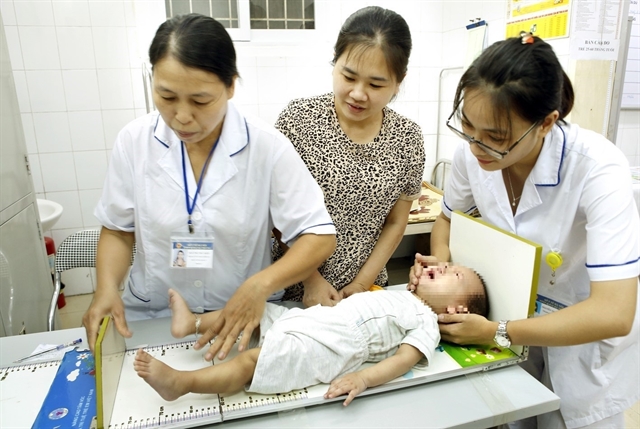 Society
Society

Growth hormone deficiency is among key causes for kids’ stunted growth besides malnutrition, birth defects, rickets, anaemia, chronic kidney failure or endocrinology diseases.

|
| Nurses measure a baby at Nguyễn Du Ward Healthcare Centre in Hà Nội's Hai Bà Trưng District. — VNA/VNS Dương Ngọc |
HÀ NỘI — 5-year-old Nguyễn L. A. of Hà Nội has been receiving treatment for her growth hormone deficiency at the National Hospital of Pediatrics nearly her entire life.
Her mother took her to the hospital when she was just 17 months old but measured just 59cm, while the normal height of her peers was between 74-86 cm.
She was diagnosed as lacking a growth hormone and started treatment when she was 19 months old.
For the first year of treatment, L. A. gained 14cm, the second year 10cm, the third year 13cm and the fourth year 6cm.
Now, the girl is 101cm – almost as tall as most other kids her age.
A boy, Trần Văn M. from Hải Phòng City, went to the hospital when he was 6 years old, being 94cm tall when the average height of children at that age is 117-127 cm.
Thanks to timely intervention, M. gained 14cm in the first year, 10cm in the second year, 7.5cm in the third year, 6cm in the fourth year and 6.5cm in the fifth year of treatment.
Doctor Nguyễn Ngọc Khánh from the hospital’s Department of Endocrinology, Medical Genetics and Metabolism said that treatment for growth hormone deficiency among kids at the hospital generated positive results.
Growth hormone deficiency was among key causes for kids’ stunted growth besides malnutrition, birth defects, rickets, anaemia, chronic kidney failure or endocrinology diseases, Khánh said.
On average, between one in every 4,000 kids and one in every 10,000 kids suffered from growth hormone deficiency which resulted in stunted growth, increased risk of broken bones and heart-related diseases, Khánh said.
He added that the National Hospital of Pediatrics started offering treatment for growth hormone deficiency in 2005 and until now, over 900 kids had received treatment.
“The hospital’s doctors examine about 30-50 kids every day as their height has developed slowly,” Khánh said.
“Parents should closely monitor their children’s height and growth to see if they are developing normally,” he said, adding that children with growth hormone deficiency could still keep pace with their peers if receiving early treatment, particularly between the ages of 4 and 13 before the growth plates – the area of growing tissues at the ends of the long bones in children and adolescents – close.
“Without proper treatment, those with growth hormone deficiency can be a maximum of 135-145cm tall,” Khánh said.
Doctor Nguyễn Thị Thư Hương from HCM City-based Nguyễn Tri Phương Hospital said that growth hormone deficiency did not have any special symptoms apart from a lack of height.
Children with stunted growth should visit endocrinology doctors after meeting with nutritionists or general pediatric doctors if no problem was found, Hương said.
Under normal treatment for growth hormone deficiency, doctors use X-Rays to take pictures of kids’ left hands, blood tests and magnetic resonance imaging (MRI) of the brain and then suggest suitable treatment, according to the doctor.
As part of the treatment, the children are injected with growth hormone doses. The injection must strictly follow doctors’ instructions and the patients must attend future appointments without fail so that doses can be adjusted if needed. — VNS




